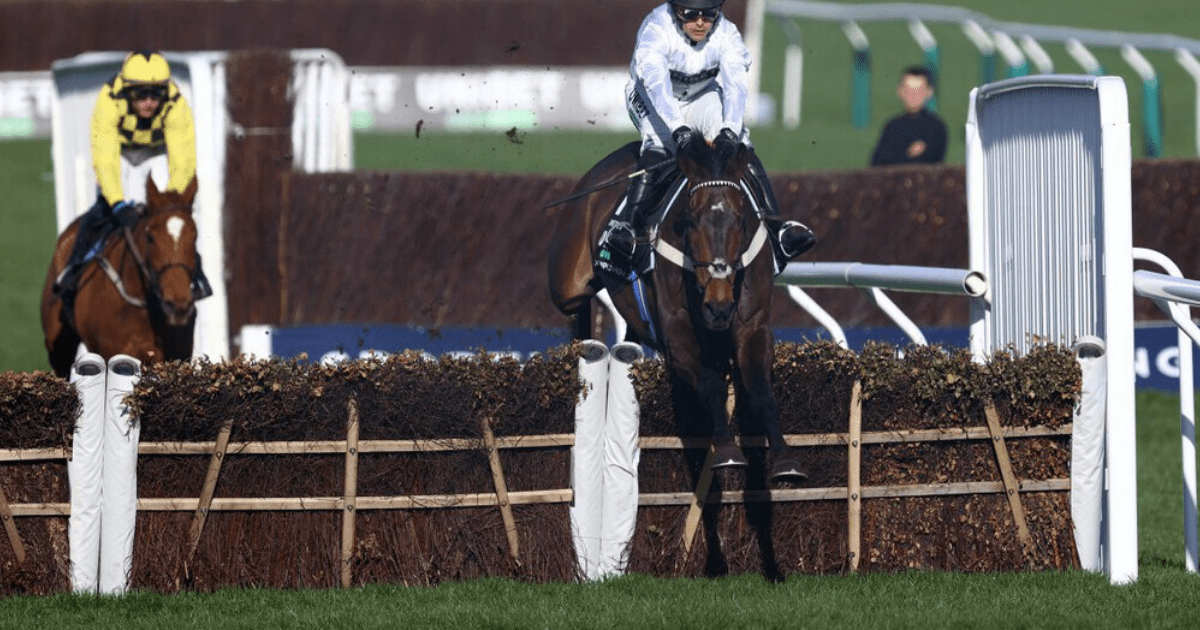In a thrilling race on Day One of the Cheltenham Festival, State Man emerged victorious in the Champion Hurdle.
Curious about how each horse fared in the competition? Keep reading for the full rundown or head over to Sun Racing's Cheltenham live blog for real-time updates.
Full Results of the Champion Hurdle Challenge Trophy
1. State Man 2-5 Fav
2. Irish Point 9-2

3. Luccia 33-1
4. Zarak The Brave 22-2
5. Colonel Mustard 50-1
6. Nemean Lion 12-1
7. Not So Sleepy 33-1
PU. Iberico Lord
Stay tuned for the complete results and horse placings.
Cheltenham Festival Schedule Day by Day
Champion Day – Tuesday, March 12
13:30 – Supreme Novices’ Hurdle (WINNER: SLADE STEEL)
14:10 – Arkle Challenge Trophy (WINNER: GAELIC WARRIOR)
14:50 – Handicap Steeple Chase (WINNER: CHIANTI CLASSICO)
15:30 – Champion Hurdle Challenge Trophy
16:10 – Mares’ Hurdle
16:50 – Juvenile Handicap Hurdle
17:30 – National Hunt Steeple Chase Challenge Cup
And the action continues with Ladies Day, St. Patrick’s Thursday, and Gold Cup Day.
How to Watch Every Cheltenham Race
ITV is broadcasting five races live on each day of the Cheltenham Festival. Tune in to ITV1 between 1 pm and 4:30 pm to catch the action.
Racing TV will cover the final two races of each day. Don't forget, you can also live stream the first five races for free on the ITVX app or website.
Stay Informed about Responsible Gambling
Before placing any bets, make sure to gamble responsibly. For a detailed guide on responsible gambling practices, visit Sun's article on the topic.
If you or someone you know needs help with a gambling problem, contact the National Gambling Helpline at 0808 8020 133 or visit GamStop to self-exclude from UK-regulated gambling websites.
Frequently Asked Questions
How is safety maintained for horses and riders in a race event?
The safety of both horses and riders is of paramount importance in UK horse racing. To ensure high safety standards are met, racecourses must adhere to strict regulations. These include the quality and condition of the jumps as well as the track. Horses receive health checks prior to and after races. Jocks are also required to wear protective gear like helmets and body guards. Moreover, the sport employs rapid response teams and veterinarians on standby to manage any incidents swiftly and competently.
How do I learn how to read a racing card?
The racecard provides important information about the race, the horses and their trainers. A racecard usually lists information such as the horse’s name, age and weight, along with the trainer, jockey and form figures that show past performance. Understanding this information can help you make better betting decisions by allowing you to gauge the chances of each horse. As part of their customer services, many betting services and racecourses provide guides on reading racecards.
What role does a steward play in horse races?
Stewards ensure that racing is fair and conducted according to rules. Stewards have the responsibility of overseeing the conduct and behavior of jockeys, other racing personnel and trainers. They monitor races for any rule infractions and hold hearings into any incidents. Stewards also have the authority to impose penalties, such as fines or suspensions, in the event of rules being breached.
There are different types of races for horses in the UK.
Yes, there are different kinds of horse races held in the UK. The most common ones fall into two categories: Flat racing and National Hunt or Jump racing. Flat racing is held over flat tracks that range from 5 furlongs up to 2 miles. National Hunt racing is a form of horse racing that emphasizes the speed of the horses and their ability to jump. Races such as steeplechases or hurdles are characterized by a variety of obstacles. In addition to these two categories, there are variations, such as handicaps (for maidens), conditions races and handicaps. Each of these has specific rules and entry criteria.
What does ‘photofinish’ in horseracing mean?
In a ‘photofinish’, two or more horses are so close to each other that it’s impossible to tell who won with the naked eyes. In these cases, race officials use finish-line cameras that take images at high speed to determine the exact moment each horse’s nose crosses the line. The photo finish helps officials determine the official finish order accurately.
How do racehorses get bred for racing and how are they selected?
Racehorses tend to be bred for the purpose of winning races. Breeders select sires and dams with proven racing pedigrees, aiming to produce offspring with optimal characteristics for speed, endurance, and temperament. Thoroughbreds are most commonly associated with racing in the UK, and their bloodlines are carefully recorded. Before starting their racing careers, potential racehorses will often undergo a selection process which includes pedigree assessments, physical assessment of conformation, and performance while in training.
Statistics
- There are over 8,000 active racehorse owners in the UK, ranging from royals to common citizens.
- In the UK, more than 14,000 people are employed directly in the horse racing industry.
- Approximately 6 million people attend horse racing events in the UK each year, making it the second most popular spectator sport in the country.
- Around 14,000 thoroughbred foals are born each year in the UK with the goal of becoming top racehorses.
- The Grand National at Aintree boasts a prize fund of around £1 million, making it the most valuable jump race in Europe.
- The National Hunt racing season in the UK sees approximately 1,000 races with hurdles or fences each year.
External Links
ascot.com
racingpost.com
betfair.com
thejockeyclub.co.uk
thejockeyclub.co.uk
tattersalls.com
How To
How to Participate in Horse Racing Syndicates in the UK
The UK offers a variety of horse racing syndicates that allow individuals to jointly own racehorses and share their costs and experiences. To join, research various syndicates to find one that matches your budget and interests. Syndicate manager’s organize the visits to trainer’s yards and races. They also handle the horse training and care. Decide on the level of involvement and financial commitment you’re comfortable with, as this can vary from syndicate to syndicate. Always make sure you have all of the required paperwork, including any agreements on ownership shares and liabilities, as well as decisions regarding your horse’s welfare and racing career.

